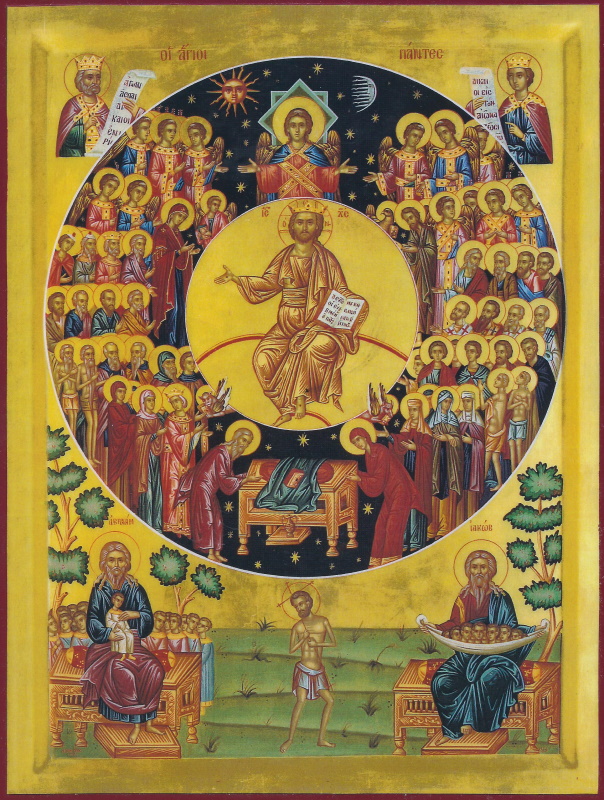Lessons from the Liturgy: Solemnity of All Saints
 Yesterday marked the Solemnity of All Saints, the celebration during the liturgical year that points the Church Militant toward the example of the Church Triumphant. Yes, the holy men and women of ages past are held up as models for those of us who are still here on earth and working out our own salvation "with fear and trembling" (Phil. 2:12). Yet, the value of the solemnity is not only in examining the faithful witness provided by generations past, because the liturgical celebration itself bears lessons and brings clarity to our lives. In a special way, the lectionary readings for this solemnity paint a very clear picture of the path toward Eternity as well as a foreshadowing of our eternal destiny.
Yesterday marked the Solemnity of All Saints, the celebration during the liturgical year that points the Church Militant toward the example of the Church Triumphant. Yes, the holy men and women of ages past are held up as models for those of us who are still here on earth and working out our own salvation "with fear and trembling" (Phil. 2:12). Yet, the value of the solemnity is not only in examining the faithful witness provided by generations past, because the liturgical celebration itself bears lessons and brings clarity to our lives. In a special way, the lectionary readings for this solemnity paint a very clear picture of the path toward Eternity as well as a foreshadowing of our eternal destiny.Let us begin, then, with the Responsorial Psalm, which recognizes that humanity is seeking a fulfilling reward; is seeking to "ascend the mountain of the Lord;" continually "seeks the face of the God of Jacob" (Ps. 3-6). Every human soul is created with an inherent need to fill an empty space within it, and every human will fill that space with something (CCC 27). As St. Augustine prayed in his Confessions: "Despite everything, man...wants to praise you...for you have made us for yourself, O Lord, and our hearts are restless until they rest in thee" (Book I, Chapter 1). In the case of the Psalmist, he has set out on an arduous journey, but he knows that he will find the Ultimate reward. He hopes to see the Face that created him and to be blessed.
In the Gospel proclamation (Mt. 5:3-11), worshipers are reminded of Christ's prescription for the journey up the Lord's high mountain. The Beatitudes are the road map toward the Eternal Destination. We learn that the path toward union with God includes "hunger and thirst for righteousness," bearing insults and persecutions, developing poverty of spirit (i.e., detachment), mourning the sinfulness present in the world, meekness (i.e., obedience), and purity of heart (see Ps. 24:4, too). However, Christ has also attached promises to the development of these virtues (holy habits): "they will be comforted," "they will be shown mercy," they will be "satisfied" in their quest, "they will be called children of God," they will inherit land as well as the Kingdom of Heaven, "they will be called children of God," and, most beautifully, "they will see God." Each of those rewards sounds wonderful, even in the midst of situations that seem unbearable and hopeless!
The second reading affirms the rewards that Christ promised while preaching the Beatitudes: "we should be called children of God;" "we shall see him [God] as he is;" and "[e]veryone who has this hope...makes himself pure." At the same time, it moves Mass-goers a step closer to the reality of "what we shall be" (1 Jn. 3:1-3). It is a glorious thing to know that this frail body, this unenlightened mind, and this selfish heart will be made less frail, more pure, and more loving. Something better than we can sense awaits beyond this earthly reality.
The first reading (Rev. 7:2-4, 9-14) allows those who hear to glean exactly what awaits. Now we know that Eternity will resemble "a great multitude" standing before a grand throne wearing beautiful white garments. Now we know that angels and saints will prostrate themselves and proclaim that "blessing and glory, wisdom and thanksgiving, honor, power, and might" belong to our God for all ages. The excitement, energy, and love is palpable as those words are proclaimed. Worshipers who are attuned to the proclamation will almost certainly desire to be a part of such a celebration.
Thus, the lesson comes full-circle. In order to participate in the glorious celebration depicted in the first reading, believers must transform themselves into disciples of the Glorious One, into children of God. In order to transform oneself into a disciple, specific action must be practices again and again; virtues (humility, mercy, chastity, obedience, etc.) must be developed. In order to begin developing virtues, a person must first desire to change his/her life and begin a diligent search for the face of God in this world.
So, a challenge can be issued to any person who reads these thoughts or who listened to the Scripture passages referenced above. Let us begin to search for God's face, for holiness. Let us begin to transform our own actions show others that such transformations lead to peace and joy. Finally, let us find ways to assist others in their efforts to elevate their own lives toward the Almighty.
[Photo found at http://www.liturgies.net/saints/allsaints/allsaints.jpg]

